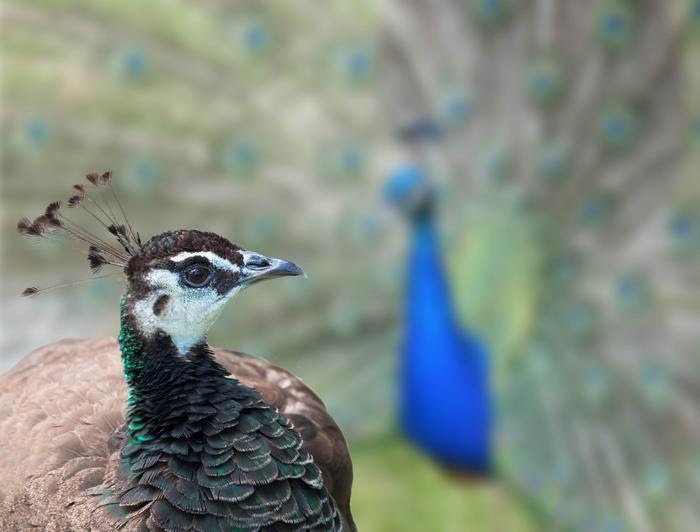Reviewed by Danielle Ellis, B.Sc.Oct 4 2023
According to a mathematical model published on October 3rd 2023 in the open access journal PLOS Biology, females can determine what makes a male appealing by seeing the choices of more experienced females, and the context of those choices counts. Females can learn to choose uncommon qualities that distinguish successful males from others rather than just mimicking their friends, according to Emily DuVal and colleagues at Florida State University in the United States.
 By focusing on the context of female mate choices, the Inferred Attractiveness hypothesis provides a new perspective on how sexual selection may function. Artist’s rendering of mate choice by a peahen. Image Credit: Composite image by Emily DuVal and Elliot Schunke, original images by Jean van der Meulen and Sally Wynn (platinumportfolio) (CC-BY 4.0, https://creativecommons.org/licenses/by/4.0/)
By focusing on the context of female mate choices, the Inferred Attractiveness hypothesis provides a new perspective on how sexual selection may function. Artist’s rendering of mate choice by a peahen. Image Credit: Composite image by Emily DuVal and Elliot Schunke, original images by Jean van der Meulen and Sally Wynn (platinumportfolio) (CC-BY 4.0, https://creativecommons.org/licenses/by/4.0/)
Sexual selection, in which features grow more prevalent due to their appeal to the opposing sex, can result in bizarre and intricate characteristics like as massive antlers, brilliant plumage, and extravagant courtship rituals. However, it is unclear why females favor some features over others.
Female preferences in a particular community frequently fluctuate throughout generations, and preferences might differ even within the same population. Existing hypotheses propose that females prefer features that indicate genetic quality, that male attributes and female preferences are connected in a positive feedback loop, or that females’ senses bias them toward specific qualities. However, no explanation adequately explains the wide range of characteristics and preferences observed in nature.
To solve this, researchers created a mathematical model in which females learn which characteristics are appealing by observing others. Young females in the model witness adult female mate selections and learn to favor features that distinguish the chosen male from other males. In other words, females learned to favor the rarest attribute of a successful man, but this trait was not always what the observed female chose.
Female preferences drove unusual male features to become more widespread over numerous generations, making them less desirable. This contributed to the preservation of male trait variety, rather than a single appealing characteristic outperforming the others.
The findings of this mathematical model are compatible with some characteristics of natural sexual selection, such as fast evolutionary changes and the persistence of diversity in male qualities and female preferences. Animals utilize social information to make decisions in a variety of situations. According to the scientists, inferring the attractiveness of possible mates could be an extension of this general propensity.
DuVal and the study co-authors concluded, “While scientists have known for a long time that females can copy each other’s choice of mates, no one has previously considered that these copying females are not mind-readers. When we considered that females can make mistakes in identifying what traits others find attractive, we found this produces patterns that have long puzzled biologists, for example maintaining variety in male traits and female preferences over time.”
Source:
Journal reference:
DuVal, E. H., et al. (2023). Inferred Attractiveness: A generalized mechanism for sexual selection that can maintain variation in traits and preferences over time. PLOS Biology. doi.org/10.1371/journal.pbio.3002269